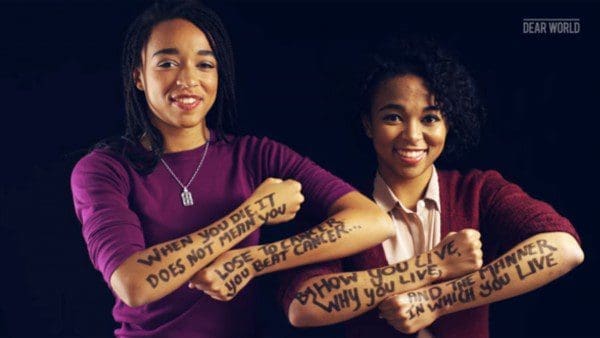Daughter Summer sent a link to a short video featuring the daughters of Stuart Scott, ESPN announcer and SportsCenter host who died after a lengthy battle with cancer.

today.com
It is a beautifully-made video that ends with these words, in their father’s voice:
When you die, it does not mean you lose to cancer. You beat cancer … by how you live, why you live and the manner in which you live.
I’ve always thought even though Hubby died of cancer, he beat it. In so many ways.
How you live. Hubby was on hormone therapy treatment for several years. One of its no-fun side effects was exhaustion. He had every reason to stay glued to the couch and become a world-class remote-controller. Instead, we ate more healthfully, started climbing tall mountains, took more road trips and made more fun. We paid no attention to the initial two-year prognosis. Hubby lived a good good good quality of life for ten years—ten years—with metastatic disease.
Why you live. Hubby lived tenaciously because he had a family he loved and because he wanted the remainder of his days to count for something. Even after the remaining nephrostomy tube fell out and he was given 24-48 hours, he perked up when he heard Son Jeremy and DIL Denise were returning for a visit. He was motivated to live as long and well as possible because there was so much to live for.
The manner in which you live. Knowing that giving back would help with the whole purpose thing, we founded a non-profit and wrote for grant funding and began speaking encouragement to audiences across the country. After becoming serious hikers and snow-shoers, Hubby took an interest in photography. He designed a web site that featured over 40 trails in our area—splattered with some amazing photos—to encourage people to get outdoors. We published a book of 28 short stories featuring cancer survivors and caregivers from across the country who were giving back. These are some of the things we did to bring meaning and purpose to this senseless diagnosis.
Back in the 70s, there was a young author and speaker, Ann Kiemel, who got the idea to run the Boston Marathon. But she had never run a marathon before. Or any other distance, for that matter.
In her book, I’m Running to Win, Kimmel writes about her training. She writes how, while on speaking tours, her traveling companion would drop her off some distance from the hotel in a new city, and then follow as she ran back. She writes about bloodied feet and heart-wrenching discouragement; about her qualifying marathon and the grandfather of all marathons — the Boston.
After the Boston, an elderly gentleman asked if she won. Ann explained to him that no one wins marathons unless they’re world class runners and the first one over the line. “But,” she said:
If you mean, was I faithful in all my [marathon] practice runs and my training, and did I give it my best and did I finish? Then, yes, I won … I really won.
Hubby was faithful to all his training. He gave it his best and persevered and lived as fully as possible when he had every reason to plead exhaustion.
He may have died of cancer. But he beat cancer. He really did.
What about you? Whether you have cancer or not, how ought you to live?
P.S. If you found this post inspirational or helpful, please share, tweet or pin!

Leave a Reply